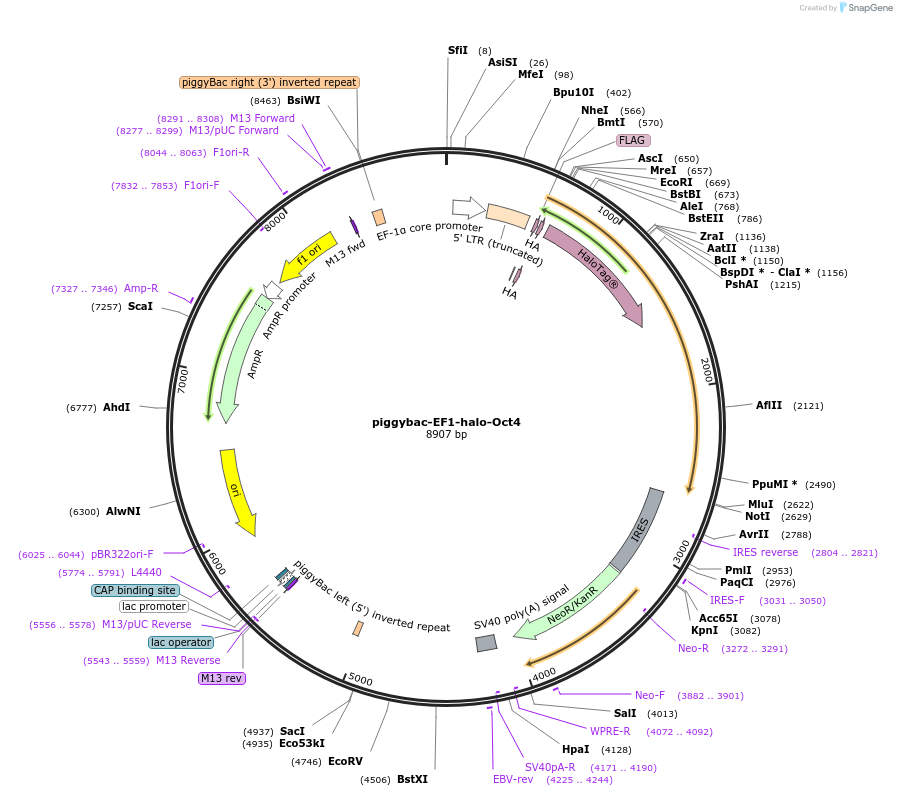piggybac-EF1-halo-Oct4
(Plasmid
#197909)
-
Purposesingle-particle tracking for OCT4
-
Depositing Lab
-
Publication
-
Sequence Information
Ordering
| Item | Catalog # | Description | Quantity | Price (USD) | |
|---|---|---|---|---|---|
| Plasmid | 197909 | Standard format: Plasmid sent in bacteria as agar stab | 1 | $89 | |
Backbone
-
Vector backbonepBR322
-
Backbone manufacturersynthetic
- Backbone size w/o insert (bp) 7872
- Total vector size (bp) 9010
-
Vector typeMammalian Expression
-
Selectable markersNeomycin (select with G418)
Growth in Bacteria
-
Bacterial Resistance(s)Ampicillin, 100 μg/mL
-
Growth Temperature37°C
-
Growth Strain(s)DH5alpha
-
Copy numberHigh Copy
Gene/Insert
-
Gene/Insert namepou5f1
-
Alt namepou5f1, oct4
-
SpeciesM. musculus (mouse)
-
Insert Size (bp)1062
-
GenBank IDNM_001252452.1 NP_038661.2
-
Entrez GenePou5f1 (a.k.a. NF-A3, Oct-3, Oct-3/4, Oct-4, Oct3, Oct3/4, Oct4, Otf-3, Otf-4, Otf3, Otf3-rs7, Otf3g, Otf4)
- Promoter EF1
-
Tag
/ Fusion Protein
- Halotag (N terminal on insert)
Cloning Information
- Cloning method Restriction Enzyme
- 5′ cloning site NheI (not destroyed)
- 3′ cloning site Not1 (not destroyed)
- 5′ sequencing primer tttgcctgaccctgcttgc
- (Common Sequencing Primers)
Resource Information
-
Supplemental Documents
Terms and Licenses
-
Academic/Nonprofit Terms
-
Industry Terms
- Not Available to Industry
Trademarks:
- Zeocin® is an InvivoGen trademark.
Depositor Comments
Please visit https://www.biorxiv.org/content/10.1101/2022.10.26.513917v1 for bioRxiv preprint.
Addgene QC found a deletion in EF1a promoter that will not affect plasmid function.
These plasmids were created by your colleagues. Please acknowledge the Principal Investigator, cite the article in which the plasmids were described, and include Addgene in the Materials and Methods of your future publications.
-
For your Materials & Methods section:
piggybac-EF1-halo-Oct4 was a gift from James Zhe Liu (Addgene plasmid # 197909 ; http://n2t.net/addgene:197909 ; RRID:Addgene_197909) -
For your References section:
Spatial organization of the 3D genome encodes gene co-expression programs in single cells. Dong P, Zhang S, Xie L, Wang L, Lemire AL, Lander AD, Chang HY, Liu ZJ. bioRxiv 2022.10.26.513917 10.1101/2022.10.26.513917







